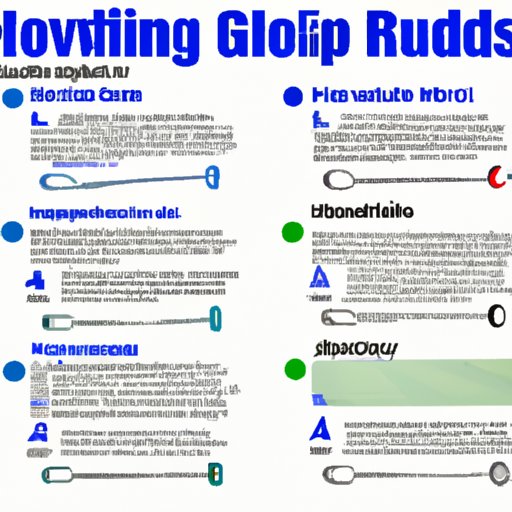Introduction
If you’re a golfer, chances are you’ve heard of the term “handicap”. But what exactly is a golf handicap and how does it work? A golf handicap is a numerical measure of a golfer’s potential ability, based on their past performances over a period of time. It’s designed to enable players of different skill levels to compete against each other on an even playing field. Knowing your handicap can be beneficial for many reasons and this article will explain how to calculate your handicap, what it means, and how to use it to improve your game.
Explaining the Golf Handicap System: A Step-by-Step Guide
The golf handicap system is based on the USGA Handicap System which was established by the United States Golf Association. In order to calculate your handicap, you must first record your scores from at least 5 rounds of golf. Each round should be played on a regulation course and the length of the course should be the same as the one you usually play. Once you have your scores, subtract the course rating from each score to get your differential. The course rating is the USGA’s evaluation of the difficulty of the course. The lower the course rating, the easier the course is to play. Your lowest differentials from your last 20 rounds are then averaged out to give you your handicap index.
“The USGA Handicap System is designed to make the game of golf more enjoyable by enabling players of differing abilities to compete on an equitable basis,” says John Bodenhamer, USGA Senior Managing Director of Rules and Competitions. “It’s important to remember that a Handicap Index is not a fixed number; it is a measure of a player’s potential so it can change as often as the player plays.”
How to Use Your Golf Handicap
Your golf handicap can be used in a variety of ways. If you are competing in a tournament, you can use your handicap to adjust your score according to the rules of the tournament. For example, if you are playing in a stroke play tournament, your score would be adjusted by taking your handicap into account. The higher your handicap, the more strokes you would receive.
If you are playing with other players who have different handicaps, you can also use your handicap to make sure everyone is playing on an even playing field. For example, if one player has a handicap of 18 and the other has a handicap of 12, the player with the higher handicap would receive 6 extra strokes. This allows players of all skill levels to compete against each other without one player having an unfair advantage.

The Benefits of Knowing Your Golf Handicap
Knowing your golf handicap can help you improve your game. By keeping track of your scores and calculating your handicap, you can get an accurate measure of your performance and use that information to pinpoint areas where you need to focus on improving. You can also use your handicap to track your progress and set goals for yourself.
Having a golf handicap also provides a level playing field when competing against other players. You can use your handicap to make sure everyone is playing on an even playing field, regardless of their skill level. This allows players of all abilities to compete against each other without one player having an unfair advantage.

Understanding the Different Types of Golf Handicaps
There are two main types of golf handicaps: USGA Handicap Index and Course Handicap. The USGA Handicap Index is the official handicap recognized by the USGA and is calculated using a formula that takes into account the difficulty of the courses you have played. The Course Handicap, on the other hand, is a number that is specific to the course you are playing and takes into account the slope and rating of the course. It is calculated by multiplying your USGA Handicap Index by the slope rating of the course.

Tips for Improving Your Golf Handicap
Improving your golf handicap can be achieved by practicing regularly and playing as much as possible. Taking lessons from a qualified instructor can also help you to identify areas where you need to focus on improving and provide tips and drills to help you reach your goals. Joining a golf league or a local club can also be beneficial, as it gives you the opportunity to play and compete with other players who have similar handicaps.
Conclusion
Knowing your golf handicap can be beneficial for many reasons. It can help you to understand your game better and identify areas where you need to focus on improving. It can also provide a level playing field when competing against other players, regardless of their skill level. If you want to improve your handicap, the best way to do so is to practice regularly and play as much as possible. With dedication and hard work, you can achieve your goals and become a better golfer.
(Note: Is this article not meeting your expectations? Do you have knowledge or insights to share? Unlock new opportunities and expand your reach by joining our authors team. Click Registration to join us and share your expertise with our readers.)
